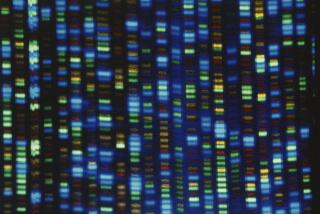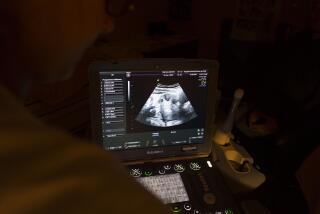Biotech Firms to Supply Tests for Viruses in Blood
- Share via
Chiron and Gen-Probe, two California-based biotechnology companies, Monday announced an agreement to begin supplying a network of nonprofit blood centers with a new, highly sensitive method for checking blood for two dangerous viruses--hepatitis C, a growing cause of chronic liver disease, and human immunodeficiency virus (HIV), the cause of AIDS.
The contract with America’s Blood Centers follows a similar agreement with the American Red Cross signed earlier this year. Together, the blood center consortium and the Red Cross account for more than 90% of the nation’s blood supply.
Company officials expect the Chiron/Gen-Probe test to be used on two-thirds of the 12 million blood units drawn in the U.S. annually. The testing, although still experimental and under the supervision of the Food and Drug Administration, will begin by April 1 and is expected to be fully implemented by blood banks around the country by the end of the year.
Worldwide, sales for these products could exceed $400 million a year once the testing is in full swing, said Bob Barrett, director of Chiron’s blood-testing division.
America’s Blood Centers is now negotiating an agreement with the Roche Molecular Systems unit of Roche Group to provide a test for hepatitis C using a similar method. That agreement is expected to cover about a third of the blood units drawn in this country.
It is hoped that the new tests will virtually eliminate the estimated 10 to 20 cases of AIDS and 100 to 350 cases of hepatitis C attributed to blood transfusions each year in the U.S.
“This adds another layer of safety to our blood supply, which is already considered very safe,” said Melissa McMillan, a spokeswoman for America’s Blood Centers, which collects more than 6 million units of blood from donors each year--about the same as the American Red Cross.
She said the testing is expected to add as much as $10 to current per-unit costs, which now average $75.
Existing tests, which check for the presence of viral proteins or antibodies to the viruses, have proved effective in reducing the risk of serious infection in blood recipients. But they aren’t sensitive enough to detect evidence of the viruses early in such infections. As a result, blood transfusions still account for a small number of AIDS and hepatitis C cases each year.
Chiron closed at $22.69 in Nasdaq trading, down 38 cents.
More to Read
Sign up for Essential California
The most important California stories and recommendations in your inbox every morning.
You may occasionally receive promotional content from the Los Angeles Times.












